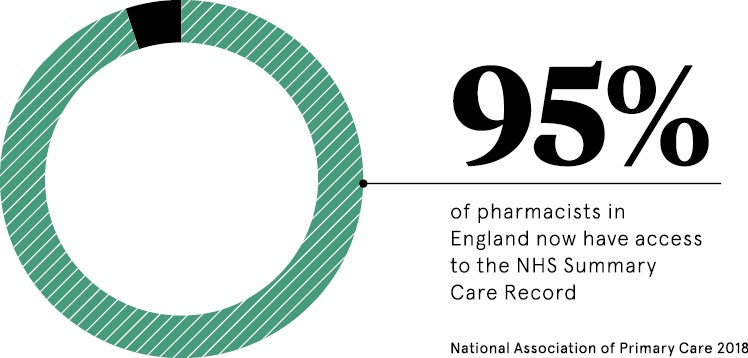Pharmacy could be on the verge a golden age, rekindling an influence last felt during the pestle-and-mortar days of apothecary. A wave of automation, from robotics to intelligence-driven software, is propelling pharmacists back to the frontline of healthcare where their clinical expertise is becoming increasingly effective. Their core dispensing commitment remains a huge task with the NHS devouring £17.4 billion of medicines in 2017-18, up 3.5 per cent from 2016-17, and 1.1 billion prescriptions – that’s 2,000 a minute – through community prescribing.
Pharmacists have more free time to see patients now dispensing has been automated and this has an impact upstream through GPs and hospitals
It’s enough to suffocate the profession’s wider ambitions, but pharmacists are being liberated from their dispensing rooms to do more than straighten out packets of throat lozenges and the hot water bottle displays thanks to technology.
New tech can free up time for pharmacists
The industry is now served by tech that can deliver medicines swiftly and safely to free up pharmacists’ time to advise patients, and deflate the pressure-cooker demands on GPs and hospital accident and emergency units.
Compared to how fast companies like Amazon used online technologies, pharmacy has been slow, but there were an enormous amount of regulatory and legal requirements to work through,” says Phil Day, superintendent pharmacist at online giants Pharmacy2U, the largest NHS-registered pharmacy. “But it is much more advanced now and we are seeing real benefits from technology.
“There will always be a role for public-facing high street pharmacies, but they have to change to adapt to the changing needs of their patients.”
Those needs are a spaghetti-like tangle of increasing co-morbidities – more than 24 per cent of adults take three or more medicines, according to NHS Digital figures – an ageing population and funding restrictions. High street trading conditions are challenging with Boots declaring it may have to close some of its 2,485 UK stores after issuing a shock profit warning at the start of April.
Algorithms can speed up and streamline dispensing
The emergence of technologies that flash through bar codes, select and pack pills, and maintain high levels of accuracy round-the-clock, could not have come at a better time for healthcare.
The NHS Electronic Prescription Service now operates in 93 per cent of GP surgeries and Mr Day sees exciting prospects for artificial intelligence and data analytics to advance personalised medicine.
Algorithms can handle the bewildering complexity of pharmacy ordering while accounting for seasonal and localised variations, and techniques pioneered in the automotive industry have been applied to improve efficiency and reduce error rates that cost the NHS around £1.6 billion annually.
Pharmacy groups are increasingly turning to hub-and-spoke operations that supply medicines from giant high-tech warehouses on industrial estates among communities of click-and-deliver consumer enterprises.

Are pharmacy robots the future?
The multi-faceted dividend is cost-efficiency, reliable delivery, security and time-savings. Research in the Pharmaceutical Journal reported one NHS trust achieving a 50 per cent reduction of dispensing errors within four months of installing a pharmacy robot, while a Scottish pharmacist was able to more than double prescription volumes and reduce patient waiting times from ten minutes to one with automation.
Dr Paul Mayberry, who runs a chain of seven community pharmacies in South Wales, devised the PillTime service that delivers pouches of pre-sorted medication direct to patients after using data analytics to discover clients were not adhering to prescribed regimes.
“Pharmacists are highly trained health professionals and the most accessible, but too often they weren’t available because they were heavily involved in the dispensing process,” he says.
“However, pharmacists have more free time to see patients now dispensing has been automated and this has an impact upstream through GPs and hospitals. Services like Pharmacy2U and PillTime provide real benefits across the system by the intelligent use of technology and software.”
New scheme could save nurses 90 minutes a day
Andy Beesely, managing director of Medication Management Robotics, which specialises in the machinery that sorts and packs multiple medication prescriptions in seconds, believes time-savings will radiate through healthcare to benefit patients.
His Cheshire-based company is part of a pilot scheme delivering PillTime pouches on three wards at Salford Royal Hospital that has recorded savings of 90 minutes a day for nurses.
“The future benefits could be huge, but pulling health networks together and getting the integration right between different settings is key,” he says.
It is a view echoed by the National Pharmacy Association, the trade association of independent pharmacies, whose chair Nitin Sodha concludes: “What’s needed now is a shared vision of how the sector can use technology to achieve efficiencies and meet modern consumer expectations, without losing the ‘human touch’ in healthcare.”
New tech can free up time for pharmacists
Algorithms can speed up and streamline dispensing

